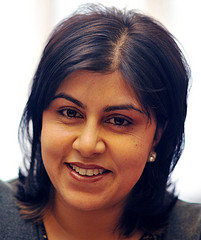Baroness Warsi – 2013 Speech to the UN Security Council
Below is the text of the speech made by Baroness Warsi to members of the the UN Security Council at Lancaster House in London on 11th February 2013.
I am delighted to welcome you here tonight.
We are honoured to be joined by both our current partners on the Council and by those who left at the end of last year.
And I would like to extend a particular welcome to my fellow parliamentarians and our guests from the United Nations Association-UK.
In January we said farewell to Germany, South Africa, India, Portugal and Colombia, who stepped down from the UN Security Council.
I want to thank their representatives here tonight for the excellent collaboration we have enjoyed over the past two years – without which the Council would have been unable to respond effectively to international crises, not least the huge changes we have seen across the Middle East and North Africa.
I now have the pleasure to welcome five new members onto the Council – Argentina, Australia, Luxembourg, the Republic of Korea and Rwanda.
Each of you will bring new perspectives and priorities to the Council’s agenda. I’m sure you will also bring with you a sense of pragmatism, and a commitment to working together to bring about peaceful resolutions to the myriad challenges to global peace and security.
Colleagues in the Foreign and Commonwealth Office – whether in London, New York or elsewhere in our overseas network – are ready to work closely with you on all UN issues…
…not just the issues we agree on, but those we may approach from different perspectives.
This is, after all, the purpose of the Security Council.
The Council is the fundamental UN instrument for maintaining international peace and security. It is what the world looks to when there are threats to international peace and security or humanitarian disasters.
It brings together different ideas and a range of perspectives. It is the forum for negotiation and debate, and for seeking international consensus on matters that affect all of us.
This is not an easy process, and it can at times test Council unity. But it is a process to which we must all remain committed and it is vital that we work closely together.
The issues at stake are too important for us not to.
I have been Minister for the United Nations for only a few months, but have already had the privilege to visit New York twice to see the UN and the Security Council in action.
My first was in September to attend the UN General Assembly Ministerial week where Heads of State, Government and Ministers from around the globe convened in New York to mark the start of an intense period of debate and negotiation on the full spectrum of international issues.
And last month I attended a debate in New York on Counter Terrorism chaired by Pakistani Foreign Minister Khar. In that debate I stressed the importance of a comprehensive global approach to countering terrorism in all its forms.
This shared commitment to tackling threats to our collective peace and security is the driving force behind Council business. And while 2012 was not without its challenges, we can still be proud of our achievements.
In Somalia we have ensured that the transition roadmap obligations are delivered and that there is adequate support for the peacekeeping mission, AMISOM…
In Yemen, which hosted a Security Council visit last month, we have supported the political process to help keep transition on track…
And in Sudan and South Sudan it was the Council’s action that gave the African Union’s roadmap the strength and resources it needed to successfully bring both parties to the negotiating table and prevent all-out conflict.
These achievements are all too often overlooked, amid questions of Council effectiveness.
It is of course right that we continue to set a high bar for the important work the Council does. But the examples I mention show just a fraction of what can be achieved when we come together and take decisive action.
And it is in this spirit that we should look ahead.
There’s little doubt that we will face new challenges in 2013.
In Mali, the Security Council and its members will be instrumental in supporting the pushing back of the armed militia, and in doing so protecting millions of civilians…
In Somalia, which remains a personal priority for my Prime Minister, the Council will need to set the long-term response and ensure stability…
In the Democratic Republic of Congo, the Council will need to support a unified process to ensure stability and prosperity in the eastern part of the country…
And, of course, the Council will need to put aside differences and commit to reaching resolutions in Syria and between Israel and Palestine. I cannot stress this point enough. The Council must united and act decisively to encourage all parties to come to the negotiating table.
It is clear that we have a lot to do. But if we work together, I believe we can achieve a great deal.
Before I wrap things up, I would like to thank again those member states who left at the end of 2012 for their contribution to the Council over the past two years.
We have greatly valued your tireless work and commitment in what has been an immensely busy period.
We look forward to continuing our work with you bilaterally and multilaterally in the years ahead, as we do with the new Council members.

